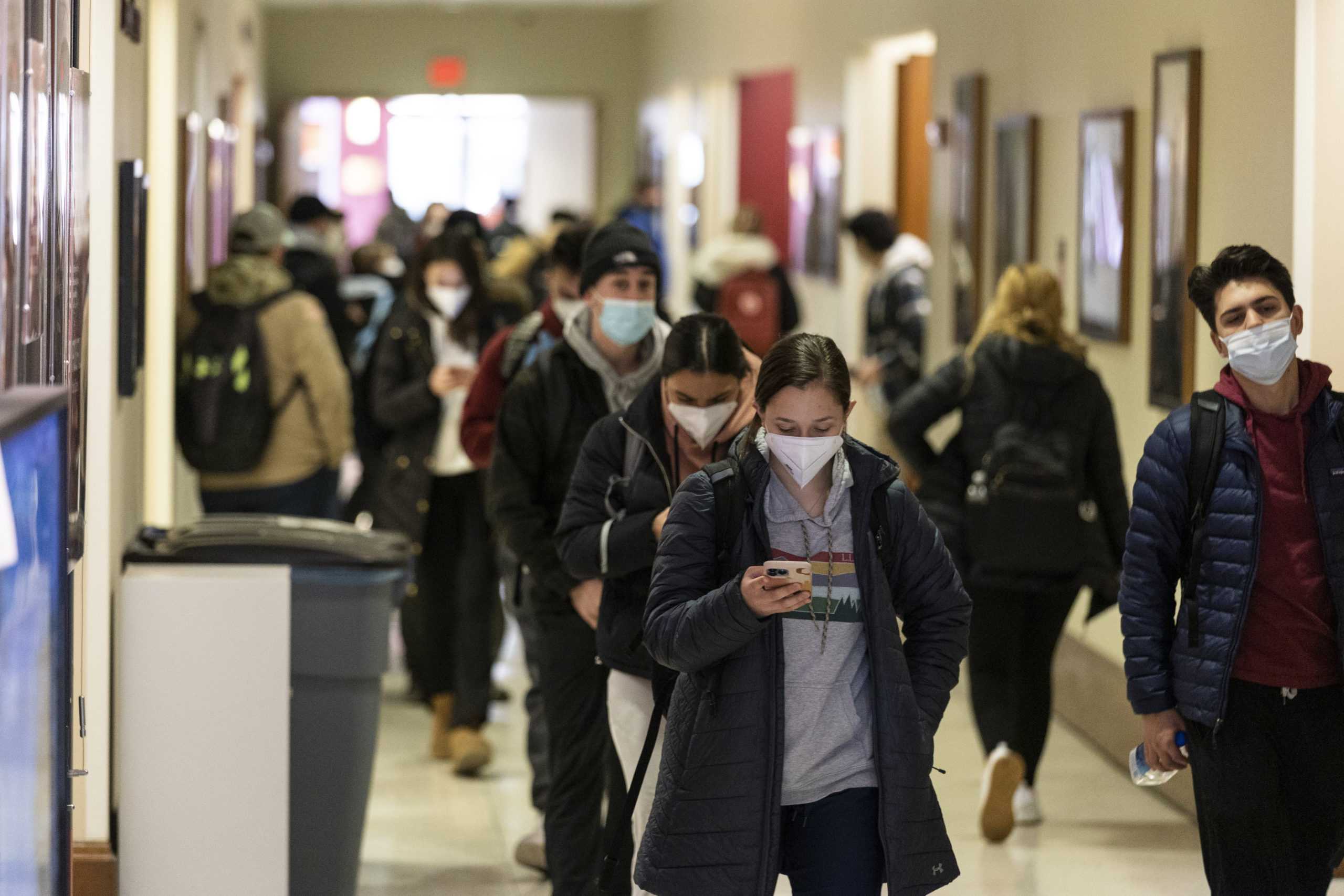The spring semester began with new masking requirements, and free masks, as a new covid-19 variant, omicron, caused a surge in cases across the country.
All members of the university community could receive KN95 masks, which they were expected to wear indoors on campus, as part of those requirements.
The new requirements were conveyed to the university in a Jan. 7 email from Cheryl McConnell, Ph.D., provost and vice president for Academic Affairs, and Cary Anderson, Ed.D., associate provost and vice president for Student Life.
KN95 masks, according to the Centers for Disease Control and Prevention, “offer even more protection,” against the virus compared to both loosely and finely woven cloth masks. The CDC website states, “well-fitting NIOSH-approved respirators (including N95s) offer the highest level of protection.”
KN95 masks are not required in private offices or residences, according to the Jan. 7 email.
On Jan. 13, five days before the start of classes, faculty received an email from Usha Rao, Ph.D., associate professor of chemistry and founding director of the Office of Teaching and Learning. The email contained a syllabus statement on classroom masking policies, which faculty could include in their syllabi.
According to the statement, “All students, regardless of vaccination and booster status, are expected to wear KN95, KF94, or N95 masks, fully covering the nose and mouth, inside all academic buildings and during the entire class period . . . Students who are in violation of the mask policy will be asked to leave the classroom in order to protect the health and safety of all students, marked absent, and reported to Public Safety.”
The statement also reiterated a policy regarding eating and drinking in classrooms, which had been conveyed to the university community in earlier communications. No food and drink are allowed in classrooms at least through Jan. 31, according to the new policy.
Residential students arrived on campus to find two masks per resident in their rooms, Anderson wrote in an email to The Hawk. Employees were also allotted two masks, generally distributed by department
chairs and supervisors.
Non-residential students could obtain two masks from the Public Safety and Security Service Center in Campion 229 or other locations on campus, Anderson said. “In at least one case the pick-up location was running low so they were temporarily handing out one [mask],” Anderson said.
While initially allocated two masks, those who need them can get more, Anderson said. He added, “We ask that people do not take more than they need.”

St. Joe’s initially purchased 40,000 KN95 masks with another 20,000 masks on the way, Anderson said. The masks are manufactured by Guangzhou Harley Commodity Co Ltd. and sold through Bona Fide Masks.
In addition to the Public Safety Office in Campion, masks are available at the library circulation desk, the Writing Center in Merion Hall, all dean’s offices, all advising centers, the Commuter Lounge and from building liaisons. Anderson said other mask locations may be added if needed throughout the semester.
Angela Rowe McDonald, Ph.D., dean of the School of Health Studies and Education, handed out masks in Merion Hall last week for the first days of in-person classes. McDonald said she and other members of academic leadership, who also handed out masks around campus, were eager to be visible and engage with the start of the spring semester.
“We want to make sure that people have the new masks that are available to be worn when they go into an academic setting and that everybody’s all set,” McDonald said. “I was glad to be out and about in the hallways as the students were coming in on the first couple of days of classes after so many Zoom meetings.”
McDonald waited at one of the entrances of Merion Hall and passed out masks as well as knocked on classroom doors to ask if anyone needed an upgraded KN95 mask.
“I’d take like 40 masks down, and they were going out like hotcakes,” McDonald said. “Tuesday we handed out a lot of masks, on Wednesday we had a lot of students coming into our mask distribution areas.”
Staff in the Writing Center, one of the distribution sites in Merion Hall, handed out nearly 200 masks in the first two days of classes, according to Jenny Spinner, Ph.D., professor of English and director of the
Writing Center.
Paul Patterson, Ph.D., associate professor of English, who teaches in Merion Hall, said in his classroom, students have been compliant with mandates “for the most part.”
“The first day of classes was a little rough,” Patterson said. “I had five students who did not have the proper mask on, and I had to ask them to leave. There were a number of students and some staff, people in the building, who weren’t wearing the proper masks but when asked, most people went
and got the right mask.”
Patterson said he was able to get a pack of the KN95 masks from administrators and has not had to ask students to leave class due to wearing the incorrect masks since then.
“Having proper masks and wearing them properly is important,” Patterson said. “A lot of classrooms don’t have windows. That lack of ventilation is not ideal in this situation. But I do think the masks certainly increase the safety level and to help prevent the spread of
the virus.”















































